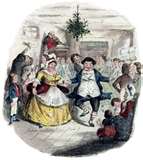Well my tree's up and it's lovely! You know trees always look so small against the sky, but as soon as you try to get them in your living room you realize how large they actually are, mine ended up going in the family room instead because of its ten foot stature! There is something just so thrilling about going out in the cold and wading through the snow in search of the perfect Christmas tree that makes even grown-ups excited and breathless and rosy. I have always enjoyed reading the circular letter by American poet, Robert Frost, entitled simply Christmas Trees. My favorite line is:
A thousand Christmas trees I didn't know I had!
... I can't help wishing I could send you one
In wishing you herewith a Merry Christmas.
I would encourage you to find this short poem, and especially, to find the one formatted as a children's story illustrated by Ted Rand.








